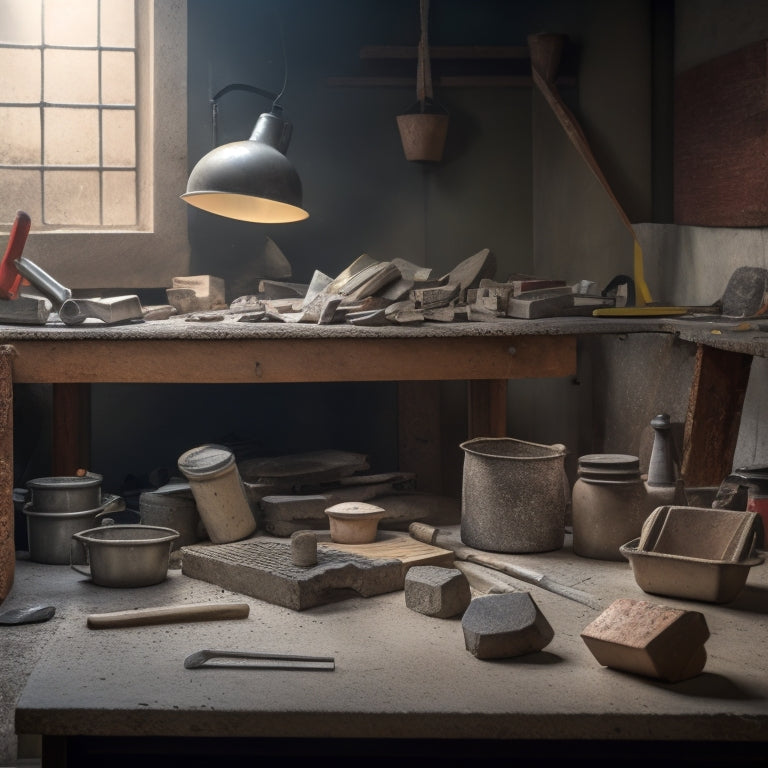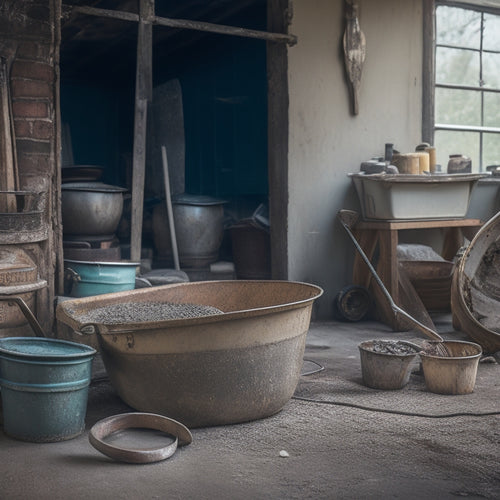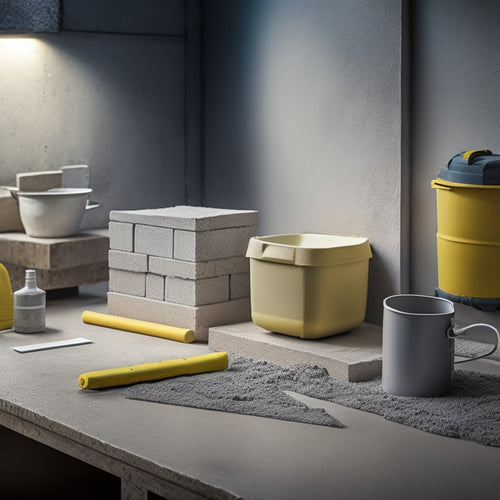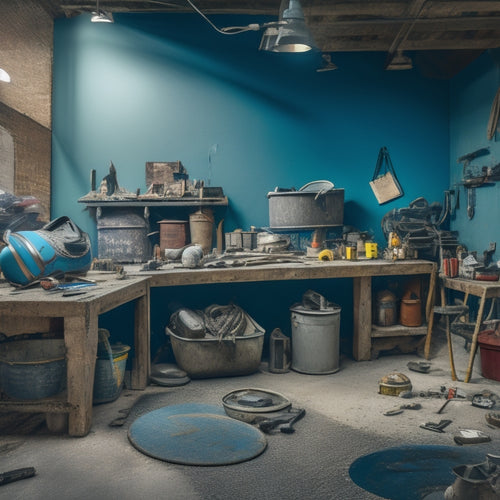
5 Best Hand Tools for Concrete Block Building
Share
When building with concrete blocks, you'll need a reliable set of hand tools to achieve professional results. Start with a high-quality trowel for efficient mortar handling, and a heavy-duty hammer for breaking blocks with precision. Add precise chisels for fine details, an efficient jointer for finishing joints, and a versatile tamping tool for compacting blocks effectively. These five essential tools will help you tackle block building projects with confidence. By understanding the unique benefits and features of each tool, you'll be well on your way to crafting solid foundations and achieving exceptional results in your concrete block building endeavors.
Key Takeaways
• High-quality trowels with sturdy handles and high-carbon steel blades are essential for efficient mortar handling in concrete block building.
• Heavy-duty hammers with durable handles and heads are necessary for breaking concrete blocks with precision and confidence.
• A set of precise chisels, including flat, pointed, and claw types, is necessary for fine details and complex designs in concrete work.
• Jointers, such as bucket and pointer jointers, are crucial for achieving professional finishes in block joints, and selection should consider block size and joint type.
• Versatile tamping tools, including hand tampers, plate compactors, and rammers, ensure solid foundations by compacting blocks effectively in various soil conditions.
Essential Trowels for Block Laying
When building with concrete blocks, you'll rely heavily on a versatile trowel to efficiently scoop, carry, and place mortar, making a high-quality trowel an indispensable tool for the job. A good trowel will help you master block laying techniques, ensuring a strong and stable structure. Look for a trowel with a sturdy handle and a blade made from high-carbon steel, which will withstand the rigors of daily use.
To get the most out of your trowel, regular maintenance is essential. Clean your trowel thoroughly after each use, and apply a thin layer of oil to prevent rust. Store it in a dry place, away from direct sunlight. You should also inspect your trowel regularly for signs of wear, such as cracks or bent blades, and replace it if necessary.
Heavy-Duty Hammers for Breaking
Breaking up concrete blocks or demolition work requires a heavy-duty hammer that can withstand intense force and repeated blows, making it an essential tool in your concrete block building arsenal.
When it comes to demolition techniques, having the right hammer can make all the difference. You'll want to choose a hammer that's designed for heavy-duty use, with a durable handle and a robust head that can withstand the impact.
There are several types of heavy-duty hammers to contemplate, including claw hammers, ball-peen hammers, and sledgehammers. Claw hammers are ideal for general demolition work, while ball-peen hammers are better suited for more precise demolition tasks. Sledgehammers, on the other hand, are perfect for heavy-duty demolition work that requires maximum force.
When selecting a heavy-duty hammer, look for features such as a shock-absorbing handle, a wear-resistant head, and a balanced design that reduces fatigue.
With the right hammer in your toolbox, you'll be able to tackle even the toughest demolition projects with confidence and precision.
Precise Chisels for Detail Work
You'll need a set of precise chisels in your concrete block building toolkit to tackle the finer details of your project, such as removing old mortar or creating decorative grooves. With the right chisel types and precision techniques, you'll be able to achieve professional-looking results.
| Chisel Type | Material | Best For |
|---|---|---|
| Flat Chisel | High-carbon steel | Removing old mortar and debris |
| Pointed Chisel | Tungsten carbide | Carving decorative grooves and patterns |
| Claw Chisel | Forged steel | Breaking and prying concrete blocks |
When selecting chisels, consider the material and hardness of the concrete blocks you're working with. For example, tungsten carbide chisels are ideal for carving decorative grooves in hard concrete, while forged steel chisels are better suited for breaking and prying softer blocks. By mastering precision techniques, such as using the correct striking angle and applying controlled force, you'll be able to achieve precise cuts and details that elevate your concrete block building project. With the right chisels and techniques, you'll have the freedom to create complex designs and patterns that showcase your skills and creativity.
Efficient Jointers for Finishing
To achieve a professional-looking finish, your concrete block building toolkit should include an efficient jointer that can effectively strike and smooth out joints between blocks. This essential tool guarantees a strong bond between blocks, creating a solid foundation for your structure.
You'll find two primary jointer types: bucket jointers and pointer jointers. Bucket jointers are ideal for larger joints, as they can hold more material, while pointer jointers are better suited for smaller joints and more precise joint finishing.
When selecting a jointer, consider the size of your blocks and the type of joint you're working with. A high-quality jointer should be durable, easy to maneuver, and provide consistent results.
Look for jointers with adjustable handles and comfortable grips to reduce fatigue during extended use. Additionally, consider the material and construction of the jointer's blade or striking surface, as this will impact its performance and lifespan.
Versatile Tamping Tools for Compaction
For ideal concrete block building, your toolkit should include a versatile tamping tool that effectively compacts and settles the blocks, guaranteeing a solid foundation and preventing settling or shifting over time. A good tamping tool will help you achieve the necessary density and stability in your concrete block structures. When choosing a tamping tool, take into account the type of blocks you're working with, as well as the soil conditions on your building site.
Here are some key factors to take into account when selecting a tamping tool:
| Tool Type | Advantages | Applications |
|---|---|---|
| Hand Tamper | Lightweight, portable | Small to medium-sized blocks, soil preparation |
| Plate Compactor | High compaction force, efficient | Large blocks, heavy-duty construction |
| Rammers | High impact force, effective | Dense soils, deep foundation work |
In addition to choosing the right tamping tool, it's vital to master manual compaction techniques to guarantee effective block settling. Regular tamping tool maintenance is also important to prevent wear and tear, and to guarantee peak performance. By selecting the right tamping tool and honing your compaction skills, you'll be able to build strong, durable concrete block structures that will last for years to come.
Frequently Asked Questions
What Safety Gear Is Necessary for Concrete Block Building?
When working with concrete blocks, you'll need essential safety gear, including impact-resistant eye protection with anti-fog coating and hearing protection like earplugs or earmuffs to prevent permanent damage from flying debris and loud machinery.
Can I Use Power Tools for Concrete Block Building?
"You think you're a rebel, ditching hand tools for power tools, but listen up: while power tools bring speed and efficiency, they're limited in tight spaces and can compromise precision, so know when to wield that power wisely."
How Do I Clean and Maintain Hand Tools?
You'll prevent tool rust by drying and oiling them after use, and storing them in a dry place or toolbox with silica gel packets; organize your hand tool storage by categorizing and labeling for easy access.
What Is the Best Way to Store Hand Tools on Site?
"You're probably tired of tripping over your tools on site, right? Invest in a portable tool chest or pegboard with designated slots for each tool, ensuring a clutter-free workspace and maximizing your tool organization and storage solutions."
Are There Any Specific Tool Brands Recommended for Concrete Block Building?
When selecting tools for concrete block building, you'll want to contemplate brands that offer durable, rust-resistant features. Compare brands like DeWalt, Makita, and Bosch, weighing their pros and cons to find the best fit for your needs.
Conclusion
You've got the right tools for the job, now it's time to get building!
With these five essentials in your toolbox, you'll be well on your way to constructing a sturdy concrete block structure.
But will you be able to tackle the toughest tasks and achieve a professional finish?
With the right tools, the answer is a resounding yes.
Get to work and see the results for yourself!
Related Posts
-

Top Tools for Mixing Concrete at Home
When mixing concrete at home, you'll need a range of tools to guarantee a successful operation. Start with essential ...
-

What Tools Do I Need for Concrete Block Laying
You'll need a thorough set of tools to guarantee accurate, efficient, and professional concrete block laying. Essenti...
-

What Tools Do You Need for Concrete Flooring
You'll need a thorough arsenal of specialized tools to achieve a high-quality, professional-looking concrete floor, i...


